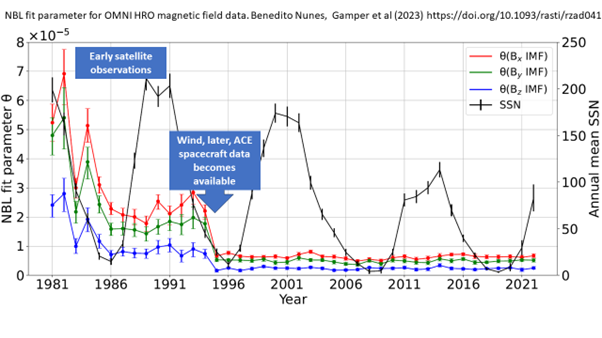Physics Department News
Warwick Physics Undergraduates help develop new data quality flag for space weather
Final year Physics Undergraduate project students and their project supervisor, Professor Sandra Chapman at the University of Warwick have collaborated with researchers at John Hopkins Applied Physics Laboratory (USA) to develop a new ‘data change’ flag.
Space weather can have significant impact over a wide range of technological systems including power grids, aviation, satellites and communications. In common with studies across the geophysical sciences, space weather modelling and prediction requires long term space and ground-based parameters and indices that necessarily aggregate multiple observations, the details of which can change with time. The Newcomb-Benford law (NBL) specifies the relative occurrence rates of the leading digit in a sequence of numbers arising from multiple operations under certain conditions, the first non-zero digit in a number is more likely to be 1 than 2, 2 than 3, and so on. In this first application to space weather parameters and indices, the team have showed that the NBL can detect changes in the instrumentation and calibration underlying long-term geophysical records, solely from the processed data records. In space weather, as in other fields such as climate change, it is critical to be able to verify that any observed secular change is not a result of changes in how the data record is constructed. As composite indices are becoming more widespread across the geosciences, the NBL may provide a generic data flag indicating changes in the constituent raw data, calibration or sampling method.

Professor Chapman says:
“Space weather is becoming increasingly important as our world becomes more connected, relying on satellites, communications and extended power transmission grids. The study of the climate of space weather relies on data records going back over half a century or more and this work provides a new independent method to test for changes in how these records are constructed.”
The students learned to take some fun ideas they had and translated them into useful science by receiving funding from the Institute for Advanced Teaching and Learning (IATL) at the University for their summer project. Following their research over the summer break, they have published a paper as joint 1st authors in RAS Techniques and Instruments titled ‘Newcomb-Benford Law as a generic flag for changes in the derivation of long-term solar terrestrial physics timeseries.’ Both students are now undertaking PhDs at the University.
